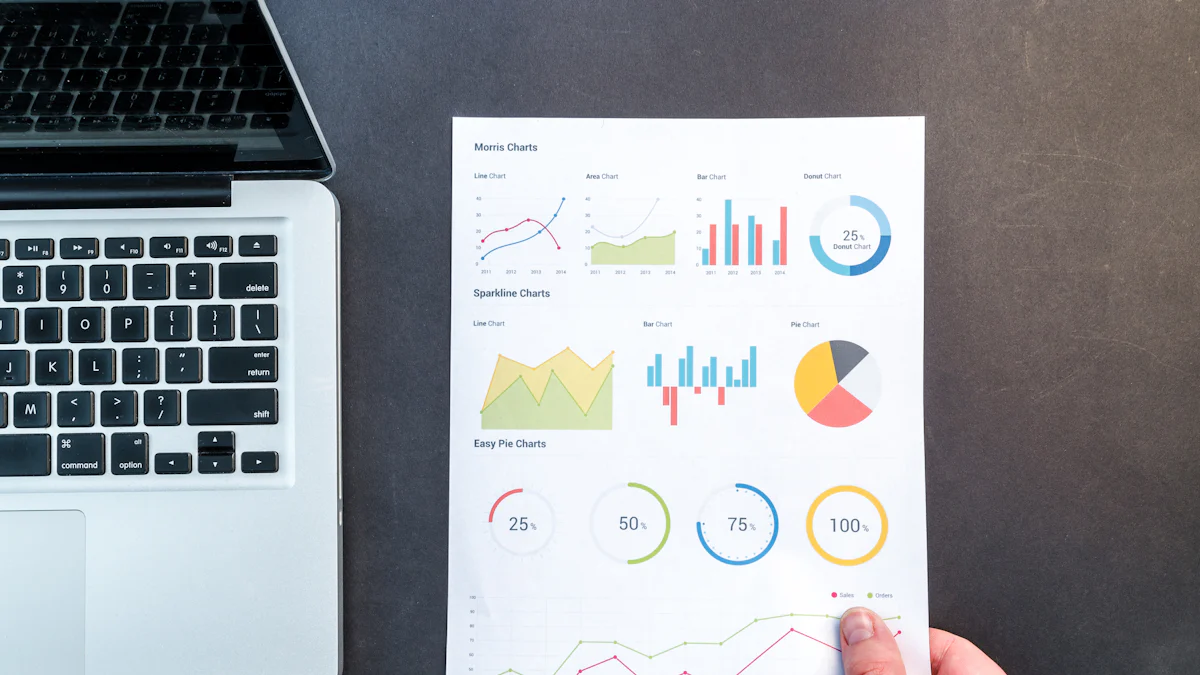

Business Intelligence Vendors
Sean, Industry Editor
Oct 08, 2024

Business Intelligence (BI) transforms raw data into actionable insights. In today's fast-paced business world, data plays a crucial role in decision-making. Companies rely on data to optimize operations and strategies. You might wonder how businesses manage vast amounts of information. This is where Business Intelligence Vendors come into play. They provide tools and solutions that help organizations gather, analyze, and visualize data efficiently. With the BI market expected to reach $59.7 billion globally, these vendors are essential for companies aiming to stay competitive and make informed decisions.
Understanding Business Intelligence Vendors
Definition of Business Intelligence
Business Intelligence (BI) involves transforming raw data into meaningful insights. It helps you make informed decisions by analyzing current data. BI consists of several key components:
Key components of BI
- Data Collection: Gathering data from various sources.
- Data Integration: Combining data into a unified view.
- Data Analysis: Examining data to uncover patterns.
- Data Visualization: Presenting data in an understandable format.
These components work together to provide a comprehensive view of your business operations.
Evolution of BI over time
BI has evolved significantly. Initially, it focused on basic reporting and analysis. Over time, it has incorporated advanced technologies like artificial intelligence and machine learning. Today, BI tools offer real-time insights, enabling you to respond quickly to market changes.
How BI differs from data analytics
BI and data analytics often get confused, but they serve different purposes.
Comparison of BI and data analytics
- BI: Descriptive in nature. It helps you understand what is happening in your business right now.
- Data Analytics: More predictive. It focuses on forecasting future trends based on current data.
Unique features of BI
BI provides unique features that set it apart:
- User-Friendly Dashboards: Easy-to-use interfaces for quick insights.
- Real-Time Data Access: Immediate access to up-to-date information.
- Comprehensive Reporting: Detailed reports that cover various aspects of your business.
Business Intelligence Vendors play a crucial role in delivering these features. They offer tools that help you harness the power of data, making them indispensable in today’s data-driven world.
Who are Business Intelligence Vendors?
Definition and role of Business Intelligence Vendors
Business Intelligence Vendors provide essential tools and software that help you transform raw data into actionable insights. They play a crucial role in enabling companies to make informed decisions by offering various services and technologies.
Types of BI vendors
- Full-Stack Vendors: These vendors offer comprehensive solutions, including data integration, analysis, and visualization.
- Specialized Vendors: They focus on specific areas like data visualization or reporting.
- Cloud-Based Vendors: These vendors provide BI solutions through cloud platforms, offering flexibility and scalability.
Services offered by BI vendors
- Data Integration: Combining data from different sources into a unified view.
- Reporting Tools: Creating detailed reports to understand business performance.
- Dashboards: Visual interfaces that provide real-time insights.
- Self-Service BI: Allowing users to create reports and dashboards without IT assistance.
Major players in the BI vendor market
The BI marketplace is dynamic, with several key players leading the industry.
Overview of leading BI vendors
Some of the major Business Intelligence Vendors include:
- FineBI: Known for its powerful data visualization capabilities.
- Power BI: Offers robust integration with Microsoft products.
- Qlik: Provides associative data indexing for deeper insights.
- Cognos: Features advanced analytics and reporting.
- Looker: Focuses on data exploration and discovery.
- Business Objects: Offers comprehensive BI solutions for large enterprises.
Each vendor provides a mix of common and exclusive features, such as automation and visualization.
Market share and influence
These vendors hold significant market share and influence. They drive innovation by offering self-service BI, which empowers users to create insights without complex technical processes. This advantage makes them indispensable in today’s data-driven business environment.
Tools and Technologies Provided by Business Intelligence Vendors

Common BI tools
Business Intelligence Vendors offer a variety of tools to help you transform data into actionable insights. These tools are essential for understanding your business operations and making informed decisions.
Data visualization tools
Data visualization tools allow you to present complex data in an easy-to-understand format. They help you create charts, graphs, and maps that reveal patterns and trends. With these tools, you can quickly grasp insights and communicate them effectively to your team. FineBI and Power BI are popular choices, known for their intuitive interfaces and powerful visualization capabilities.
Reporting and dashboard tools
Reporting and dashboard tools provide real-time insights into your business performance. They enable you to generate detailed reports and interactive dashboards. These tools help you monitor key performance indicators (KPIs) and track progress toward your goals. Interactive Dashboards and Reports offered by BI vendors make it easy to explore data and find insights quickly.
Emerging technologies in BI
Business Intelligence Vendors continuously innovate, incorporating emerging technologies to enhance their offerings. These advancements provide you with more powerful and flexible solutions.
AI and machine learning in BI
AI and machine learning are transforming the BI landscape. These technologies enable predictive analytics, allowing you to forecast future trends based on current data. They automate data analysis, uncovering hidden patterns and insights. By leveraging AI, you can make more accurate and timely decisions, giving your business a competitive edge.
Cloud-based BI solutions
Cloud-based BI solutions offer flexibility and scalability. They allow you to access BI tools from anywhere, at any time. This approach reduces the need for on-premises infrastructure, lowering costs and simplifying deployment. Cloud-Based Vendors provide Software as a Service (SaaS) options, making it easier for you to integrate and scale BI solutions according to your needs.
Business Intelligence Vendors play a crucial role in providing these tools and technologies. They help you harness the power of data, enabling you to make data-driven decisions that enhance efficiency and growth.
Benefits of Using Business Intelligence Vendors
Business Intelligence Vendors provide numerous advantages that can significantly enhance your business operations. By leveraging their tools and services, you can transform raw data into valuable insights, leading to improved decision-making and operational efficiency.
Enhanced decision-making
Business Intelligence Vendors empower you to make informed decisions by providing data-driven insights. These insights allow you to understand your business environment better and respond effectively to changes.
Data-driven insights
With the help of Business Intelligence Vendors, you gain access to comprehensive data analysis. This analysis helps you identify trends and patterns that might not be immediately apparent. By understanding these patterns, you can make strategic decisions that align with your business goals. For instance, you can optimize your marketing strategies by analyzing customer behavior data.
Predictive analytics is another powerful tool offered by Business Intelligence Vendors. It allows you to forecast future trends based on historical data. By anticipating market changes, you can proactively adjust your strategies to stay ahead of the competition. This foresight can lead to increased efficiency and profitability.
Predictive analytics is another powerful tool offered by Business Intelligence Vendors. It allows you to forecast future trends based on historical data. By anticipating market changes, you can proactively adjust your strategies to stay ahead of the competition. This foresight can lead to increased efficiency and profitability.
Operational efficiency
Business Intelligence Vendors also play a crucial role in enhancing your operational efficiency. They provide tools that streamline processes and reduce costs, ultimately improving your bottom line.
Streamlined processes
By utilizing the services of Business Intelligence Vendors, you can automate various business processes. Automation reduces the need for manual intervention, minimizing errors and saving time. For example, automated reporting tools can generate real-time reports, allowing you to focus on strategic tasks rather than data collection.
Cost reduction
Cost reduction is a significant benefit of using Business Intelligence Vendors. Their solutions help you identify areas where resources are being wasted. By optimizing these areas, you can reduce operational costs and allocate resources more effectively. This optimization not only saves money but also enhances your overall business performance.
Applications of Business Intelligence in Various Industries

Business Intelligence Vendors provide tools that transform data into actionable insights across various industries. These tools help you understand complex data, enabling you to make informed decisions that drive success. Let's explore how Business Intelligence Vendors impact the retail and healthcare sectors.
BI in retail
In the retail industry, understanding customer behavior and managing inventory efficiently are crucial for success. Business Intelligence Vendors offer solutions that help you achieve these goals.
Customer behavior analysis
You can use BI tools to analyze customer behavior. These tools help you identify buying patterns and preferences. By understanding what your customers want, you can tailor your marketing strategies to meet their needs. For example, you might discover that certain products sell better during specific seasons. This insight allows you to adjust your inventory and marketing efforts accordingly, maximizing sales and customer satisfaction.
Inventory management
Efficient inventory management is essential in retail. Business Intelligence Vendors provide tools that help you optimize your inventory levels. These tools analyze sales data to predict future demand, ensuring you have the right products in stock at the right time. By minimizing overstock and stockouts, you can reduce costs and improve customer satisfaction. This approach not only enhances operational efficiency but also boosts your bottom line.
BI in healthcare
The healthcare industry benefits significantly from Business Intelligence Vendors. These vendors offer tools that improve patient care and operational efficiency.
Patient data analysis
BI tools allow you to analyze patient data effectively. By examining data from past clinical trials, you can identify patterns and predictors of outcomes. This analysis helps you enhance the efficiency and effectiveness of clinical trials. You can also use BI tools to monitor patient health trends, enabling proactive care and improving patient outcomes. With these insights, healthcare providers can deliver more personalized and effective treatments.
Operational efficiency
Operational efficiency is vital in healthcare. Business Intelligence Vendors offer solutions that streamline processes and reduce costs. For instance, BI tools can automate administrative tasks, freeing up staff to focus on patient care. By optimizing resource allocation, you can improve service delivery and reduce wait times. This efficiency not only enhances patient satisfaction but also improves the overall performance of healthcare facilities.
Business Intelligence Vendors play a pivotal role in transforming industries by providing tools that unlock the power of data. Whether in retail or healthcare, these vendors help you make data-driven decisions that lead to improved performance and growth.
Challenges Faced by Business Intelligence Vendors
Business Intelligence Vendors face several challenges in today's data-driven world. Understanding these challenges helps you appreciate the complexities involved in providing effective BI solutions.
Data privacy and security concerns
Data privacy and security remain top priorities for Business Intelligence Vendors. You must ensure that your data handling practices comply with regulations like the General Data Protection Regulation (GDPR) and the California Consumer Privacy Act (CCPA). These laws emphasize transparency and security, reshaping how businesses approach data.
Compliance with regulations
Compliance with regulations is crucial. You need to adhere to laws that impose strict requirements for data privacy. These regulations demand robust data protection strategies. For example, the GDPR requires businesses to handle data ethically, ensuring that personal information remains secure. Failure to comply can lead to significant penalties.
Protecting sensitive information
Protecting sensitive information is another critical challenge. You must implement strong security measures to safeguard data. This involves using encryption, access controls, and regular audits. By doing so, you protect your business and maintain customer trust.
Integration with existing systems
Integrating BI solutions with existing systems presents another set of challenges. You need to ensure that new tools work seamlessly with your current infrastructure.
Compatibility issues
Compatibility issues often arise when integrating new BI tools. You must assess whether these tools align with your existing systems. This involves evaluating software compatibility and ensuring that data flows smoothly between platforms. Addressing these issues helps you avoid disruptions in your operations.
Data migration challenges
Data migration poses additional challenges. You need to transfer data from old systems to new ones without losing information. This process requires careful planning and execution. By managing data migration effectively, you ensure that your BI solutions provide accurate and reliable insights.
Business Intelligence Vendors play a vital role in overcoming these challenges. By addressing data privacy, security, and integration issues, they help you harness the full potential of your data.
Future Trends in Business Intelligence Vendors
Business Intelligence Vendors are at the forefront of technological advancements, shaping the future of data analysis and decision-making. As you explore the evolving landscape of BI, you'll notice two significant trends: the increasing use of AI and machine learning, and the rise of self-service BI.
Increasing use of AI and machine learning
AI and machine learning have revolutionized how businesses analyze data. These technologies enhance the capabilities of Business Intelligence Vendors, allowing them to offer more sophisticated tools.
Automation in BI processes
Automation plays a crucial role in modern BI processes. By integrating AI, Business Intelligence Vendors enable you to automate repetitive tasks. This automation reduces manual effort and minimizes errors. For instance, AI can automatically generate reports, freeing up your time for strategic decision-making. Automation not only increases efficiency but also ensures that you have access to real-time insights.
Advanced predictive analytics
Predictive analytics is a game-changer in the world of BI. Machine learning algorithms analyze historical data to identify patterns and trends. This analysis allows you to make accurate predictions about future outcomes. By leveraging predictive analytics, you can optimize operations, anticipate customer needs, and mitigate risks. Business Intelligence Vendors provide tools that empower you to harness these insights, giving your business a competitive edge.
The rise of self-service BI
Self-service BI is transforming how you interact with data. It empowers non-technical users to explore and analyze data independently, without relying on IT support.
Empowering non-technical users
Business Intelligence Vendors offer self-service BI tools that democratize data access. These tools allow you to create reports and dashboards without needing technical expertise. By enabling you to explore data on your own, self-service BI fosters a culture of data-driven decision-making. You can quickly gain insights and respond to changes in your business environment.
User-friendly interfaces
User-friendly interfaces are a hallmark of self-service BI tools. Business Intelligence Vendors design these interfaces to be intuitive and easy to navigate. With drag-and-drop features and interactive visualizations, you can effortlessly explore data and uncover insights. User-friendly interfaces make it easier for you to engage with data, enhancing your ability to make informed decisions.
Business Intelligence (BI) vendors play a pivotal role in transforming raw data into actionable insights. They empower you to make informed decisions, enhancing your business's efficiency and growth. As the BI market continues to expand, reaching an estimated $63.76 billion by 2032, the importance of these vendors in strategic decision-making becomes even more pronounced. Looking ahead, BI solutions will need to adapt and align with your unique objectives and challenges. By leveraging advanced technologies like AI and predictive analytics, BI will remain an essential tool for achieving business success.
FAQ
Business Intelligence (BI) transforms raw data into actionable insights. It helps you make informed decisions by analyzing current data. BI tools allow you to visualize data, identify trends, and understand your business environment better.
BI vendors provide essential tools and software that help you gather, analyze, and visualize data efficiently. They enable you to make data-driven decisions, improve performance, and gain a competitive edge in the market.
BI tools offer data-driven insights that help you understand trends and patterns. By using these insights, you can make strategic decisions that align with your business goals. Predictive analytics also allows you to forecast future trends, helping you stay ahead of the competition.
BI vendors offer a range of services, including:
Data Integration: Combining data from various sources.
Reporting Tools: Creating detailed reports.
Dashboards: Providing real-time insights.
Self-Service BI: Allowing users to create reports without IT assistance.
BI vendors implement strong security measures to protect sensitive information. They use encryption, access controls, and regular audits to safeguard data. Compliance with regulations like GDPR ensures that data handling practices remain secure and transparent.
BI vendors face challenges such as data privacy concerns and integration with existing systems. They must ensure compliance with regulations and address compatibility issues to provide seamless BI solutions.
AI enhances BI by automating processes and providing advanced predictive analytics. It helps you uncover hidden patterns and make accurate predictions, giving your business a competitive advantage.
Self-service BI empowers non-technical users to explore and analyze data independently. With user-friendly interfaces, you can create reports and dashboards without relying on IT support, fostering a culture of data-driven decision-making.
Continue Reading About Business Intelligence Vendors
10 Game-Changing Project Management Reporting Types!
Unlock project success with 10 must-know reporting types! Track progress, manage risks, and stay on budget like a pro.
Lewis
Mar 03, 2025
2025 Best Data Integration Solutions and Selection Guide
Explore top data integration solutions for 2025, enhancing data management and operational efficiency with leading platforms like Fivetran and Talend.
Howard
Dec 19, 2024
2025's Best Data Validation Tools: Top 7 Picks
Explore the top 7 data validation tools of 2025, featuring key features, benefits, user experiences, and pricing to ensure accurate and reliable data.
Howard
Aug 09, 2024
Which Data Analysis Projects Work Best for Beginners?
Ready to shine in 2025? Discover easy data analysis projects to boost your portfolio, learn data cleaning, visualization, and tackle real-world challenges!
Lewis
Mar 10, 2025
Best Data Integration Vendors for Seamless Workflows
Discover the top 20 data integration vendors of 2025 for seamless workflows. Compare tools like Talend, AWS Glue, and Fivetran to optimize your data processes.
Howard
Jan 22, 2025
Best Data Management Tools of 2025
Explore the best data management tools of 2025, including FineDataLink, Talend, and Snowflake. Learn about their features, pros, cons, and ideal use cases.
Howard
Aug 04, 2024


